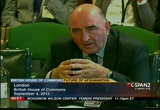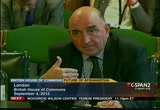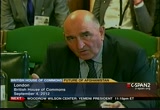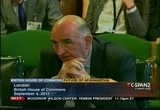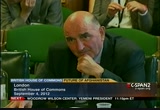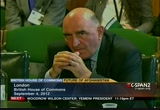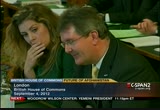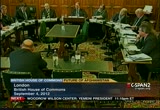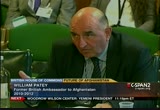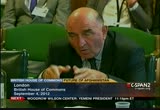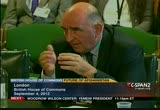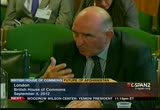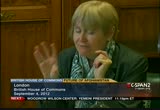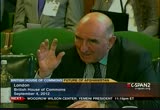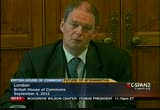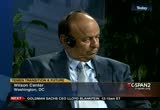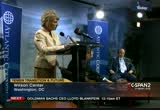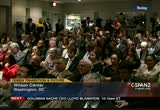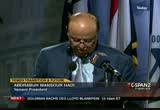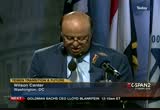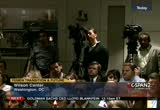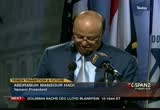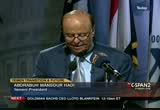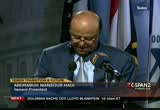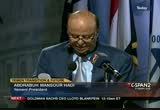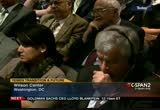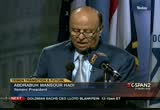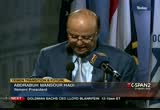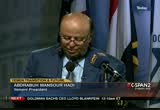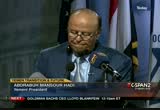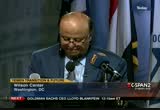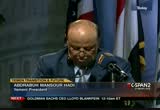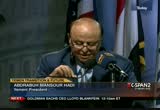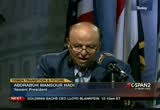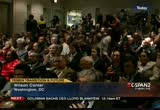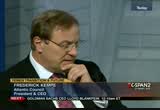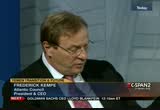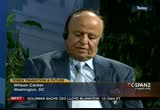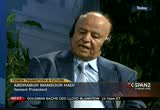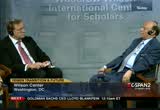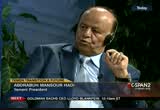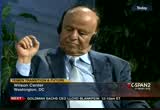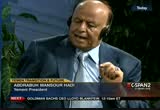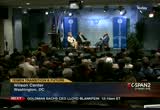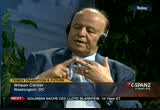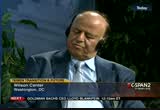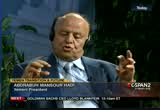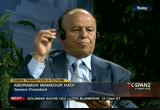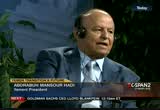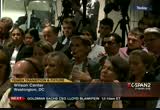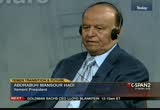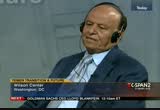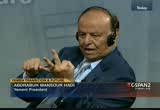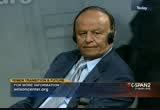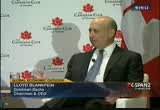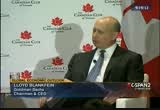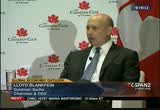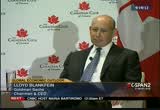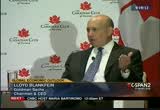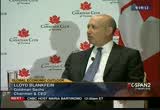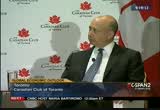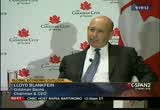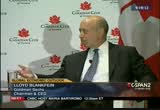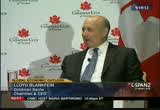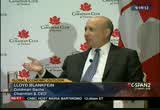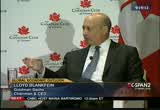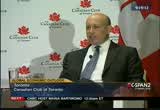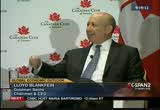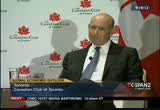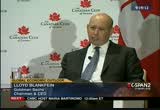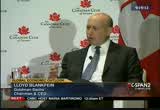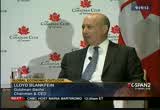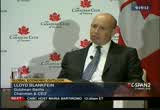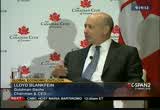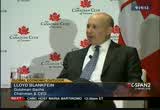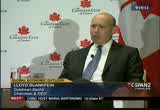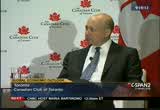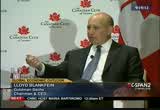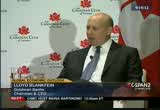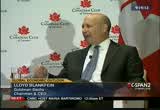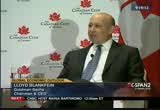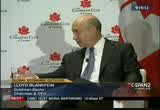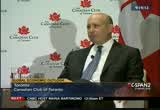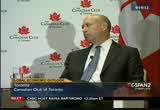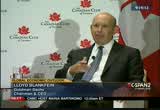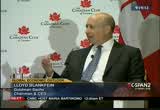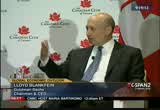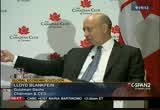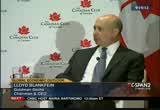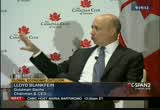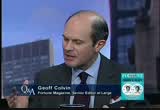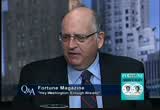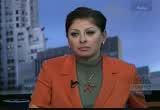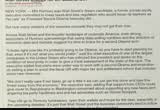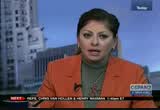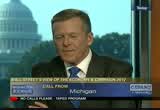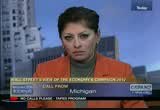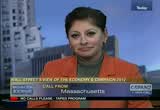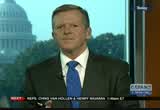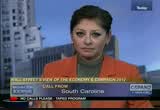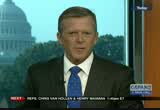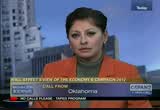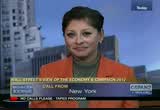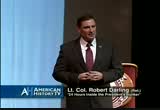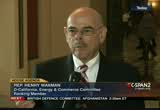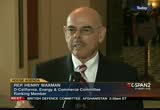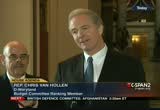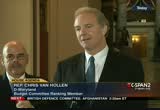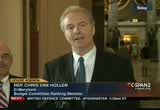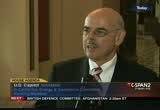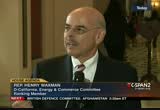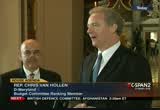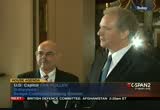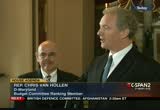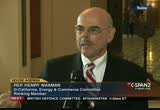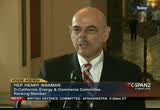tv Capital News Today CSPAN September 28, 2012 11:00pm-2:00am EDT
11:00 pm
everyone, pakistan, national community in which the taliban agree to lay down their arms and they form a political party, there may be some deal done that gives them some positions in government in the run-up to the election as there is to perform political party community talk about amnesties. there would need to be cease-fires. all of that is asserted and you would to discuss any genuine political process. that hasn't started. >> to the extent to which we, we the whole of the international community has been participating, provided a substitute economy and afghanistan to start up allow me to develop so far. is that the incentive? is there some economic incentive that brings them into this
11:01 pm
process? is it that that's going to solve the problem is it's not constitutional matters in human rights and everything clicks >> we need to start reducing the amount of money these then on afghanistan. >> howell to be sustainable within itself? >> the economic process is one where we have to keep helping the afghans fun the development for 10 years beyond what they get on with developing the mineral resources. at the same time, trying to execute a political process to reduce the pressure in the security forces and wouldn't have to be so proficient if there is a political process. you have to work on all these things at once. i've always said we must make our strategy dependent on the political deal with the taliban because that gives them a veto. you have to be a policy that
11:02 pm
says, here's the strategy that is not dependent on the taliban. the taliban to stop inciting and get an engaged the process makes the rest of it much easier. you know, i always thought we'd make the taliban the minister for anticorruption. that will be an interesting development. but she's got to pursue the political process at the same time as the rest of the, but must admit the strategy dependent on it because of the taliban and choose not to come a senior afghan said to me he did not think there'd be a serious political process until the taliban had been defeated on afghan soil by an afghan army in kandahar. so you know, you might say we're creating circumstances for that to happen. the taliban will be defeated at some stage in kandahar by an afghan army.
11:03 pm
>> can i just ask you one final question? you also said that not only was finance important, but the west being diverted, i mean, what happens to this is things are happening elsewhere the same time because nothing is solid state in terms of all these calculations in 2014. >> well that's the biggest risk. and history tells us when the troops are, our interest levels will decline significantly. and that is a danger, a big danger. if you look at the troops in iraq, somebody else's problem. there is a danger that could happen and afghanistan. and it's understandable. he got 10,000 troops on the
11:04 pm
ground and the men and women are dying, that has a degree of focus and interest that is impossible to sustain. we should recognize it as a danger point and we will be there. that'll be something else in the world that takes our attention and our energies. but we ought to remember that we should continue to invest in afghanistan. i mean, we in the british foreign office in the united states should have the capacity to keep our eye on more than one war upon. >> i suppose the key was to negotiate. it didn't work that way. if it didn't work that way in a western democracy, the do very little chance of the work in that way in afghanistan, therefore the extent to which there is an engagement, whether it's track to her otherwise with the taliban if they think they're important because you can wait a long, long time for
11:05 pm
the kind of progress in security level, which may never happen. >> you're absolutely right. i keep using that as an example. there was no military plan that has that is the subject to defeating the insurgency. our strategy is not defeating the insurgency. >> affair in which he said among the afghan leadership. >> i think they generally want assessment. they have huge differences on what terms are prepared to accept. if you talk to afghan women, they are very worthy attempts of settlement will be to their detriment. you also talk and they don't want to give up the amount of power they've had. they've had more power than they would normally have been asking us and come us in the have to
11:06 pm
compromise. at the end of the day, what is the political assignment booklet? how are people's interests engaged? in what you can do is you can reduce it to a level. i think this is what the military check it is. reduce the insurgency to a level handled by the afghans and that creates an incentive. if more taliban come to the conclusion that they can gain power through force, then they're more likely to be in the market for a compromise of an author. >> coming from the side of the community in northern ireland as a way to sustain that position, i understand that mindset, but actually sharing park and strengthen your position and not weaken it. i suppose therefore a process of national reconciliation and some day rather than talking about the political negotiation and who gets the possession and government that maybe there's a
11:07 pm
reconciliation process that needs to take place. >> i would encourage you to use your experience. to me that points to the politician. the reason for afghanistan is if you apply to northern ireland, it is the catholics have got to power the protestants tried to wrestle some of that back. >> you've repeated several times that it will take a long time to get some sort of proper political settlement and whatever possession in afghanistan to do with through the fundamentalist possession. what can be done to present the human race in the united states after they have possession? >> that's why it's important to focus on the constitution and the rule of law because the legal framework is such that
11:08 pm
women are protected in the constitution in terms of their right. any move away from the rule of law, where trade was just as our ad hoc justices applied is bad for women. we have seen that in parts of afghanistan. the reality is that it's going to be pretty difficult for women in hearts of afghanistan because as you see in pakistan, pakistan does have the rule of law, an institution, but in the remote parts you can't always enforce it. and that is going to be the reality for a lot of women in parts of afghanistan. and i think we are pretty powerless to do much about that. but what we can try and do is try and make sure that women's rights are enshrined in the comp duchenne for interrogation from that and influence.
11:09 pm
we can use our influence because if we found the afghans come obvious they were going to make it conditional on things like corruption and human rights, on how women are treated. so we have this going to give the minister of finance to do the right thing. so i think we should use their influence to the extent we have it. [inaudible] >> we have. our influence has been diminished because we are not in the ground. we will be on the ground in numbers we don't know. so will diminish. >> a couple questions about the future of afghanistan. you may have answered already. >> or break your comments about the instability for the next two years that we've laid out to an immense with draw, but there is already some other part is
11:10 pm
taught about and in the next two years who may well decide to go early. one of the risks in the next two years, both to the u.k. troops who are remaining there into any possible stability for afghanistan. thank you. >> it is than anything we should be too worried about individual countries and in their combat involvement. i mean, the french will probably be able to combat by the end of this year to have a strategic impact. and there may be others who naturally will come to the end of the combat role because it is happening at different places at different times. so there will be particular countries in a particular area but the transition is happening. they won't be redeployed anywhere else, so they will withdraw.
11:11 pm
as part of the overall transition process. if there was a mass exodus, it puts pressure on us and the americans. i don't see that happening. i think some of the exit are happening anyway i detect some of the politicians in this country is on maximizing the political benefits for something happening anyway and say we brought the troops earlier. so there is a plan. as far as our troops are concerned, we aren't home and it would not be overly affected by that. but we would be affected elect a more u.s. withdrawal or a u.s. deployment, more rapid redeployment out of helmand to house her, so there is a risk that the sort of transition plan is in place were halted tuesday railed by the americans having to redeployed more troops that
11:12 pm
dr. philippa countries. but i thought the isaf coalitions have always been contributors to say solid. the gentleman said to steer the course and the italians, so the big countries that are there but numbers, asserted the friend she brought their timetable forward a bit and that's been taken into account. >> very quickly on a scale of one to 10, one being highly unlikely and one being very likely to happen come with the caveat that the money keeps coming in, which ec the chances of afghanistan descended into civil war? >> five. >> that's not very positive. >> anything else you would like to tell us that the defense committee would be helpful if we knew?
11:13 pm
>> all i would say is, you know, coming out from it in sitting here, back in london and not having access to all the things come you are driven by a perception of what is going on by the media. and i do think we are going to have some pretty difficult times ahead, that there's going to be corruption scandals and all of that, but i don't see anything that i've seen in the last year sufficiently bad to derail this strategy. and i do think we've got the right policy in terms of the time to go. we could come out earlier. he could come out earlier and in greece the risk. the corollary of that ip is listed under would be more likely. i don't think that's true. i think there comes a point where you've outlived your usefulness and coming out in an
11:14 pm
orderly a fashion by the end of 2014 will tip the balance. i think the taliban will find it difficult to sustain an insurgent the against the people when we remove their excuse they are fighting and that will tip the balance. so however difficult it is, it is important to stay the course, but i wouldn't be advocating anything beyond. i don't think that's going to be much of a difference. >> thank you very much indeed. >> is very interesting stuff, as we expected it to be. >> see you in kabul. >> have a good trip. [inaudible]
11:15 pm
>> i was always shocked as anyone who spends time around campaigns that most of the people i talked to couldn't explain why they did anything that they were doing. how do you know that? why'd you do that? at some point is that it always stuck that way or had some sort of rule that was simply based in any research. and so i sort of went around campaigns and misused some degree about the practices that are taking place in the way people were spending money and devoting resources. as i learned about people starting a academia who are doing the field experiments, randomized controlled trials have been adopted by people in the political world and more
11:16 pm
about all the innovations in data and targeting based on basically revolutionized campaigns in the last decade. this is a major generational shift. in addition to a lot of the new forms of research changing the way campaigns operate that you have this kind of cultural tension between a lot of the old practices that are further away campaigns operate in this new empirical movement. >> my opponent and his running mate are big believers in top-down economics. they basically think if we just send another $5 trillion on tax cuts that favor the very wealthy, that -- don't do, vote.
11:17 pm
vote. [cheers and applause] >> you stop when no idea. one thing he did not do in his first four years anything is going to do in the next four years is to raise taxes. is there anything that raising taxes will help grow the economy? his plan is to continue what he's done before. the status quo has not worked. we cannot afford four more years of barack obama. we're not going to have four more years of barack obama.
11:18 pm
>> the yemeni president was in washington d.c. today to speak at the wilson's manner. mr. hadi took over the presidency in february after an uprising forced a previous president to step down after 33 years in power. security remains a major turning ament with president hadi offering to hold talks with al qaeda and other militant groups to take down their weapons. jane harman gives introductory remarks. >> do we have some more room for the president's party? let's see -- okay. good afternoon to welcome to the wilson center. i am jane harman, president and eeo. the wilson center, a living memorial to her 28th president
11:19 pm
is a vibrant arena for discussion. our charter for business or not busy, but not from creating a safe political space to engage a diversity of views and to explore today's toughest policy issues. all viewpoints are sought out and heard, free from spam. on behalf of the wilson center and the atlantic council, an honor to to welcome his excellency, abdrabuh mansour hadi, the president of the republic of yemen and to welcome members of his cabinet. we are also very pleased to have in the audience with us today, ha ha hariri, it chairman of the risky career rate advisory board. where are you? he is right there. i was in beirut shortly after
11:20 pm
her father was assassinated and subsequently, that is your brother when he was there. your family has paid a heavy price and offers much for the future of your extraordinary country. thank you for being here. i have also been in yemen and that was several members of the cabinet then and others in march of 2010. i visited the presidential power in sana i was the only rep or senator to meet with members of the opposition party at the time. it quickly became clear to me that yemen has the potential to be a vibrant civil society and the relatively peaceful transition over the past year leaves me optimistic about the future. how wonderful it would be if yemen could he come a model for
11:21 pm
the region. but for now, there are daunting problems. supplies of water and oil are virtually depleted. there are over 100,000 small alleges that desperately need help, get government services are essentially absent. yemen has the second-highest unemployment rate in the arab world, 35%. and the average person lives on less than $2 a day. it also has the second highest rated chronic child malnutrition in the world after afghanistan. in the south, the troubled region where many advocate succession, al qaeda militants have taken advantage of the turmoil to grow in size and force. hundreds of thousands of people across the country are displaced
11:22 pm
and yet, it takes many years to establish peaceful transition. it took the united states 13 years to move from declaring independence in 1776 to ratifying or can't situation in 1789. and it took us nearly 75 years more to abolish slavery. 150 years to give women the vote and 1752 outlawed racial discrimination. no one president can do it alone, that he or she can lay a foundation for the future. so history shows us that building a democratic and secure nation is hard. it takes patience and persistence and it requires strong and smart leadership. an important lesson that i
11:23 pm
learned from nine turns in the united state congress and trips to many states in transition is that their leaders have to want to move to a pluralist democracy more than their outside supporters want them to. president hadi has made it clear that he wants to build a democratic with a small d. and pluralistic country. he was sworn in as president of yemen in february after running the country single candidate election with 9010.6% of the vote. the election was the last part of the international brokered accord that provided former president saleh with immunity in exchange for his agreement to step down after more than three decades in power and they hear a mass protest in the country. perhaps this peaceful transition to serve as a model for syria,
11:24 pm
something many of us are urging. as the leader of this country, president hadi i thought with the building blocks for a peaceful future. he is committed to partnering with the u.s. in an ambitious plan to restructure his military to combat al qaeda. the plans two-pronged strategy includes cooperation to capture or kill about a dozen of al qaeda's most dangerous militants, working with persian allies to in her yemeni security forces to respond to al qaeda's larger threat to destabilize the country and its government. but there are other pieces to this as we would discuss, and this is not all about drowns. a recent months, much needed economic aid has come from the world bank, which lifted a year-long funding freeze in january. and from the imf, which occurred
11:25 pm
almost $100 million in interest-free emergency loans in april. just yesterday, the p5 and that all states pledged almost $1.5 billion in aid to yemen. president hadi said the assistant would avoid a civil war, which could be a regional and possibly global threat. the announcement came after president hadi called for more practical support from abroad to help his country's security forces fight al qaeda. he also said, and i personally agree that internal as well as external support for al qaeda must stop. in his first interview after his election, he said that a comprehensive national dialogue was a top priority for his
11:26 pm
country and his sword. he promised to involve people from political, cultural and social actions, including youth and his wide ranging national discussion, something that discussion we're having today. president transcended even said this week he would engage in traditional dialogue with islamic militants, including aqap, but only provided they put down their weapons first. mr. president, we share your desire for inclusive dialogue and we very much look forward to talking with you this afternoon about a way forward for your country. after president hadi's remarks, fred camp, the eskimos eeo counsel will moderate the q&a discussion. fred comes to the council after a remarkable career at "the wall street journal."
11:27 pm
he's authored several books, the most recent being berlin, 1961, kennedy, khrushchev and the most dangerous place on earth publisher name and is a "new york times" bestseller. the wilson center partnered for a debate here on the air transitions. it was a spectacular event and we are so priests to be joining forces with the atlantic council today. so now, please join me in welcoming the president of yemen, his excellency, president hadi who will get some opening remarks and will be followed by the q&a. [applause]
11:28 pm
[speaking in native tongue] >> translator: the director of the center and ladies and gentlemen who are here today, i am very pleased to meet with you today and gave you a brief overview of the security and political and economic situation in the republic of yemen. as you all know, gehman has a strategic location and it is in a sovereign tip of the peninsula and reaches the red sea to the south and the east and the
11:29 pm
strategic geographical importance, the state which is one of the most important waterways in the world because they can ask indian ocean and mediterranean. and so, also the unique geographic location that is reviled as a way only from the international waterways from the other porous as a sovereign sure that is 9906 kilometers, which will allow transportation and viable marks the entrance or traditional lines and due to the piracy activities, that is a byproduct of the somalian civil
11:30 pm
11:31 pm
>> making yemen an [talking over each other] tive part in the efforts to combat terrorism. due to all that's mentioned, we want to say that the stability and security of yemen is not for yemen's sake or interest, but rather a national necessity, and equally, any deterioration in the country will have extreme negative reprecautions on the area, the region, and to the global arena. after this brief overview in yemen, i will talk in brief about the political after the
11:32 pm
unification in may 22nd, 1990, yemen managed # to go steadily towards se.eing democracy and diversity, but there were mistakes that's been made mostly in the mismanagement and corruption which led eventually to the protests in starting in 2011 and the demands have changed, especially after the winds of change swept over the area of what's called the arab spring, but the negative reprecushions to the change, the complicated process nature of change led to further more complications in yemen, and the country was teetering towards civil strife, and it will become maybe worse than what's taking
11:33 pm
place in somalia. despite all of the political factors and the tribal nature and many resorted to dialogue, and there were many compromises made, and so for the peaceful transition of power, in order to get the yes , -- yemeni people to change, and we played major role in avoiding the civil war so through assistance of the united states and the gulf countries and the e.u. and the u.n. and the gulf initiative and to implement it
11:34 pm
and yemen co-signed it in november 2011 in saudi arabia, and it provided a political solution that helped in a peaceful transition away from bloodshed and distraction. implementing the gulf initiative and now yemen has executed the first step from this initiative and we have a national coalition government and the peaceful transition to power and elected new president and this is a novelty or a new thing in yemen and through the elections, yemen is expressed their will in providing or in niending --
11:35 pm
finding a solution or avoiding the civil war, and, therefore, yes, yemen voted yes for a peaceful state. civil state, mod enstate, that is based on rule of law and respect of the rights of which allow us to get into the second phase and to implement what's left of the political solution and get the yemen out of the bottleneck and to make it less safely, and we have law -- draft law of the transition that will assist in solving all the bloodshed and all the conflicts, and we still in need of the political and economic assistance that we'll help -- will help us a lot in implementing all the other segments of the gulf initiative, and this is why the yemen people
11:36 pm
are looking for. we got tired of conflicts of wars, and now and through the national dialogue that we are preparing for in order to get this dialogue as soon as possible so we will have a blueprint of a prosperous yemeni based on future freedom and equality and through good governess by reforming the administration and combat corruption and focus on development, and we are steady to lead yemen and make the yemeni people meet their potentials in comfort and stability that will reflect on the region and in the world. ladies and gentlemen, along the economic problem that the yemen republic is suffering, and we,
11:37 pm
since the turn of the first century, thousands of terrorist and terrorist international phenomena and yemen since the appearance of this hated phenomena and we are engaged in war and terrorism and adopted a security and political theory meaning that terrorism has no nation and no religion, and it is a common thread regionally and internationally, and it requires a necessity, a common effort to fight terrorism within the frame along with what we do to have the cooperation of combating terrorism with more than 40 nations, and that included all aspects in intelligence exchange,
11:38 pm
activities, and how best to combat and detour and rendition and to have bilateral meetings with those nations, and this theory that's been adopted by the yes , ma'amny -- yemen government comes along the understanding of terrorism, and today, it is not -- not a specific problem to nations, but it is rather international threat and on the political, social, economic levels. this will reflect the fears and realist threats provided by the ways and means of terrorists diversified and are transnational. there are blood and lives lost. we are still suffering from
11:39 pm
terrorism, and we paid a lot with blood and life and many of the public institutions and privately owned and it affected the tourism and now most of the hotels in yemen are closed and there are no tourists, no foreigners at all. from one other side, the serious activities helped in this place, handed 50,000 from the province to the neighboring provinces at the except of the state and provide shelter and food for those displaced and from may 2011 through september 2012 terrorism cut in distraction of schools and hospitals,
11:40 pm
buildings -- 88 schools destroyed by terrorists, and 38r armedded forces have been lost, and the wounded --3350 and the civilian death toll is above 322 wounded and 294 dead from civilian. they -- the yemen efforts in combating terrorism, we took many measures and policies on all levels and on the economic and security and league and administrative and even intellectual engagement. we need to face and combat terrorism and extremism. we enacted many laws that are specifically to combat terrorism
11:41 pm
and security level. we took many preventative measures against terrorist elements, and what -- what -- we got rid of the 344 terrorists from may 2011 to and through september 2012. we detected and arrested ten terrorist cells that contain -- that require -- many engagement of the civil society and political entities and many social players along with those official measures that's been taken by the yemen government, the public committees was civil committees assisted and combated al-qaeda fighters either by
11:42 pm
providing intelligence or their whereabouts or their participation in any action against them, and now al-qaeda targeting civilians from the areas by providing, but putting the ieds or the snipers or killing them. the challenges that we are facing in combating terrorism in yemen and it comes the high rate of unemployment and the deterioration of the gdp and there are huge numbers of people -- our friends in the united states here of this room today, they ought and should know that we have 6 million young people who are in the age bracket between 15-28 years old, and these people are a serious
11:43 pm
problem and there are 600,000 newly graduates and they've been waiting for jobs for over ten years now. there are also 70% of the population of yemen who are under the 35 years old. my country is facing many foreign intervention and especially from iran that is targeting against the development in theño' area and imposing us regional power and it is seeking to do what's be -- strategic loss, and there are many indicators that the regime in syria will fall and iranians are seeking a foothold in my country due to the strategic location of yemen, and it is --
11:44 pm
it is because of the strategic location and in the horn of africa and these activities of the iranian intervention that they have been backing many spying networks, and we detected five of those who are active in the favor of iran, and we brought them to justice, and lately, we detected a sixth network, and then they are backing the military action and media support and intelligence support and to the -- inside -- inside or south of yemen, and iran also widen their targets lease by buying political position figures and mediañ'i figures and trying to swerve the political solution in yes , ma'am men that's been adopt --
11:45 pm
yemen that's been adopted and spreading to the gulf and called it a saudi-american conspiracy, and iran created a climate of chaos and violence and that -- it is benefiting from these situations so it will have its agenda implemented, and it makes my country a halting point in its regional powers so it will target the rest of the gulf states and they have intention to expand and have power in the red sea and the arabian sea, and it is threatening the international maritime waterways and yemen was and still is one of the most countries suffering from terrorism and we are working on a clear strategy in cooperation with friends and allies to combat terrorism, and
11:46 pm
we -- we are looking forward that our friends will stand with us to face combating poverty and create jobs for the youth and development that will cement our efforts in combat terrorism that is growing in the climate of poverty and unemployment and supporting yemen will reflect positively of the rest of the area due to its deep connection and the correlation of yemen security and the regions security and because terrorism is a threat, not against one nation; it is a threat to all nations equally which will require cooperation and assistance on the international level to combat and detour terrorism and face all the challenges that will lead to extremism and terrorism.
11:47 pm
therefore, our common efforts bilaterally and internationally is a necessity in order to protect the lives and properties and all the civilians and to combat anything that will threaten the international security. ladies and gentlemen, what is important from this participation is to share the light on the economic situation in yemen. yemen today is facing three major problems of the same type. political crisis, economic crisis, and a security crisis. dlfer, the gulf initiative has created a solution of the political level, but -- and it is in the first steps the gulf
11:48 pm
initiative is -- has to prongs. phase a and phase b. phase a was to have a government, create a government between the party in power and theok opposition 50/50. we created also that the prime minister from the opposition, and after that, will go to early elections within the frame of 90 days. of course we held that election in exceptionally difficult situations. it was divided in three zones. as the firing was continue day and night and roads cut off and the oil was scarce, hospitals
11:49 pm
were not functioning because they need the oil -- electricity and then we use the reserve generators and we didn't have any diesel to have a power generators and there are big number of people who passed away, who died, especially those who are suffering from chronicle disease, kidneys or during surgeries. the situation was very complicated, but 95% of the yemen was against going into civil war. therefore, we held elections in difficult circumstances. people will go to the ballot boxes between the barrage and
11:50 pm
the fire. they don't -- they don't go to cast their votes for anything just they will go so yemen won't go into civil war, and we know full well if yemen were to go into civil war, it won't be any worse there was legislated as the president for transitional period of two years during which will engage international debate that will include all the political cross political speck rums and debate all the issues at the time and we will have --
11:51 pm
we'll have constitutional amendments after which we will have a referendum over the constitution, and the people have to decide the ways and means in which or how they'll have the security and stability of the unity of yemen. we, in yemen, the majority agree on this and on this initiative and how it would implemented that will reprerve the stability and security and unity of yemen, but we'll eventually lead to the
11:52 pm
good governance of democracy, social justice, and there is after the initiative, there is -- there will be no plaintiff and no victims be it from the north or the south, be it from the east or be it from the west. thank you for listening to me, and i'm ready for any question you might have. [applause] [inaudible conversations]
11:53 pm
>> it's always an honor at the helm, long, one of our most gifted legislatures in prelim service, thank you very much. on behalf of the atlantic and senator hagel, our chairman, we're honored to co-host this event. you outlined very clearly the problems, a economic crisis, in great detail on the human humann crisis, epic proportions, 600,000 graduates looking for work, a number of schools, and we've been working issues with
11:54 pm
the project in the middle east democracy, and the policy initiatives, but here's the question, and let's get specific on this. you need international support at a time when the west. u.s., saudi arabia, the donor's conference yesterday, new york, friends. of the meeting, and now let's get specific. what do you need. what do you specifically need particularly in the fight against terrorism, be as specific as you can, to have a wish list of things that are absolutely crucial. number two, drones. big debate in this town and around the world. some people say most effective weapon ever against terrorism.
11:55 pm
others say promotes more extremism. perhaps you have a point of view where that fits into that first question. >> translator: thank you very much for the question. first off, as far as the assistance, from saudi arabia and from the other gulf states, the yemen, i want to thank them and value the saudi arabia assistance because that helped us in a critical situation. they assisted us with oil and when we had no power and the cards for two months long from
11:56 pm
saudi arabia and for the second time, for three months, and if it with respect for the support of oil, we wouldn't be able to have, to hold elections and to implement this phase a from the gulf initiative. therefore, i want to thank king abullah, and i personally called him, and i explained to him the situation. we cannot go or halt elections and when we don't have power and the roads cut off, and during that period of 90 days, 90 days
11:57 pm
of the election, and i don't have oil, i don't have electricity roads are cut off between the provinces, people are dying inside the hospitals, and the fighting was still raging, and there's division within the armored forces and the security apparatus, the world division, and al-qaeda literally took over some provinces, but the assistance received from saudi arabia, especially oil, it helped us to go until we we were done with the elections. after -- directly after the
11:58 pm
elections, i swore in front of the parliament, and i promise the people who came from the displaced that i will do my best to extricate them, and in coordination with the united states, they cooperated, shared information with us and helped us in using the drones because the yemeni air force cannot carry out missions at night. they were soviet fighter jets made in the 70s, made 21, and 22
11:59 pm
and cannot carry out with same precision, and even if they did, they -- it's highly unlikely they would be successful. they are a link to the satellites and they pinpoint the target and they have zero margin of error.ñhr if you know exactly what target you're aiming at and practically drones and due to my military background, and i have an
12:00 am
12:01 am
army, the power military, and the assistance they provide to the military, they playeded the decisive role in etricating al-qaeda because the power military popular forces, they are also young and they fought in the front lines and the firm army was fighting behind them and they were taken by force in areas, and that's how we managed to get rid of al-qaeda and when
12:02 am
we got rid of the first emirate reign they had in those two provinces, and now they are scattered all over, but they will never gain the same force they once enjoyed because when they establish their reign, they all -- all members of al-qaeda from all over from afghanistan, pakistan, indonesia, morocco, nigeria, tunisia, egypt, syria, iraq, saudi arabia, all over. they -- even from europe, western europe, they came all over there. they have, like, kind of emirates for them. >> that's a powerful endorsement
12:03 am
of the drone strategy in combination with your own military. what in wash, what is the most important thing the u.s. can give you now and that you're asking for? to help this fight? >> translator: the most important thing we ask from the united states now, the economic aide, the economic package, it -- it -- 75% of the solution in yemen is in economic solutions because the degree of the level poverty -- it's nurturing al al-qaeda with pove. let's say when you have six
12:04 am
million young men and age bracket over 15 and less than 22 # years old. they will come and recruit into al-qaeda. then will apply the sharia law, muslim law, and the way they using the way it's adopted in iraq, and those kids in experience -- that take them and train them for three months, and after three months, once they've been brainwashed, they will ask him to call his mom so she will
12:05 am
pray for you that you will -- they would be successful, be admitted as a suicide mission to go. this is how they convince them, brainwash them while they're telling the list is way too long and probably you won't make it on the suicider's list. have your mom pray for you and ask, you know, so you will be included on theño' suicider's l. this is a very complicated problem we have, and we think that work -- working with yemen and the cooperation on the
12:06 am
economic level, economic package assistance, but as far as the cooperation with combating and fighting al-qaeda, let me tell everybody here in this room now. it is the beginning of the end of al-qaeda when we got rid of them. it was the first step to get rid of al-qaeda in the arab peninsula. >> thank you, mr. president. we know your time is short. we have about 12 minutes of your time left, i believe, and so i'm going straight to the add yeps, ask you to -- audience, ask you to keep your question, and make it a question, please, very short, and we'll go back and forth with as many questions as we can get in, mr. president. >> we need the microphone.
12:07 am
>> thank you for being here today president hadi. i'm thrilled to have had an opportunity to hear you speak about yemen, and my question, i work for towns part international, currently implementing a government project funded by usaid in yes yemen, and my question relates to the status of women. we're quite optimistic with the transition going on and talk about it being very inclusive, that it will include those populations that have been traditionally marginalized, including women. i'd like to hear your thoughts or vision on how the status of women can be improved in yemen and moving forward. >> i'd say particularly with the gcc sponsored plans. >> translator: the gcc
12:08 am
initiative outlined that women's participation in all the steps, levels, and feels on the commission that's been that i ordered to form that is working on the national dialogue. 26% of the quota are women, and this prove that we are serious about implementing the gcc initiative as far as women are concerned. >> right here. >> the middle eastern studies, and my question is that human rights watch lately to get rid
12:09 am
of the immunity from the former president sala, and there are fact finding commission that the air force uses against the protesters. do you agree on this -- the gcc is clear. we are working on implementing this initiative, and the paragraph number four grants him immunity. my job is to deliver based on the gcc initiative and not to the opposite. >> please identify yourself as you ask the question. >> thank you, maria salic, your
12:10 am
company len sigh, you said you wanted to help yemen transfer to a secular state. is this still true? if so, why have you appointed some from the party to government positions? thank you. the initiative determine all the quota of the opposition party, and the national congress political party and partners and the -- the common national dialogue are those political entities that are mentioned within the gcc and they are the co-signers on the initiative.
12:11 am
this means that it doesn't mean that -- to eliminate any entity, we try the cold war, and we were south and not, and we were in fighting. one believes in islam and one of the marxism, and we fought each other so the north will fight the south or in fighting within the south or in fighting within the north. until we were communitied in may 22 # nd, now, and we agreed on having political diversity of the islam party and the -- syria
12:12 am
and iraq, and now the government is form across the board from the political spectrum in yemen. therefore, any government will eliminate any component. this will not do yes , yemen a. we are in need of an inclusive approach, so we will make this initiative work. thank you. >> thank you, congresswoman. we appreciate it. [applause] thank you very much. [applause]
12:13 am
12:14 am
reason. i'm a firm believer the c-span video archives is a gift to the american people, arguably one of the most historical, one the most historical archives there are.gg i watch "the washington journal," the house of representatives proceedings, and c-span 2 for the u.s. senate. >> c-span, created by america's cable companies in 1979 brought to you as a public service by your television provider. goldman sachs chairman and ceo spoke to the canadian club of toronto about the european debt crisis and the u.s. political system and the challenges facing the global economy. gordon nixon, president and ceo of the royal bank of canada, moderated this 40-minute discussion. >> good morning, lloyd.
12:15 am
>> good morning. >> this is a new job for me, maybe a second career. i feel very powerful. [laughter] >> you are very powerful, that's why. [laughter] >> i feel much more powerful as a journalist than as i do as an asker of questions. delighted to have you here in canada, and i know the audience is very much looking forward to your perspective on what's going on around the world and what's going on in the financial services industry which is facing challenges, but i thought we'd start with your views on the global economy, and perhaps you could start up and make your way around the world and what you see in growth and more importantly, what are the challenges out there that we're all going to have to deal with over the next period of time? >> well, there's not enough time for all the challenges, but i'll give perspective. listen, let me give away the punch line.ñno the punch line is, i think, you know, on world basis, this is,
12:16 am
you know, the world's not going to come to an end. we're going to muddle through. there's a lot of challenges and a lot of riffs, andening the largest percentage likely outcome by far is that we get through, and i think there's a lot of actions that were to have been taken that offer relief, but there's several things that could cause things to derail in which case things will be tougher for longer, but you ask about europe, and i think the biggest problem that europe has is growth and the tail risk problem is the real go off the rail bust up of the euro. the way, a few months ago, we would have said that the two big issues for europe is do they have the capacity to bring the prief yal along and to buy enough time and get enough support so they can cure their ills, and then the second one, do they have the political will with the latter question being
12:17 am
the most important question. you hear all the pundits in the world saying the germans will never support this or that, and it would blow up. i say, did we saw anything in the last few months, it is, you know, confirms that they have the capacity because you can see they've gone all in to an extent, and i believe they have the capacity to do it, but what's a surprise to many, but has not been a surprise to me for a long time because i go and i talk to some of the leaders there, is the political will to make europe work and the euro work. you have to remember that it was a political construct, not just an economic construct, and they wear the history close to the stays, -- as far as, -- surface, and if this fails, it's 100 years before you can think of the united europe, and the consequence of the a disunited europe feel very, very heavy to the leadership. you see mrs. merkel, the
12:18 am
unlimited liquidity without the acquit essence, and the pro-european party in the election center has won, and the opposition is more european oriented. i feel it's going to be a muddle through. the real issue, of course, is growth, and the real issue is how do they solve the long term problems, and those are antagonistic to each other. solves problems means austerity, and austerity means growth. how do they sponsor growth in the short term and promise the market austerity and balance, more balanced budgets in the long term? that's the challenge ahead. i think they have enough time and the political will to get this done, but there's challenges. there's a chance of going off the rail there, but i think it's unlikely at this point, much less likely than it would have been a few months ago. >> so your old partner did the
12:19 am
right thing with the bond purchase program? others say it kicked the problem further down the road, but -- >> what you have to do in triage situations is you have to stalize the parable -- stabilize the patient, and maybe that's a different metaphor than kicking the can, but they needed to buy time. they will merely have bought time if they don't engineer structural changes to the economy, and then we'll say we just bought time, poured more money after bad money, and i wish we would have faced up to the problem, but on the other hand, if they use the time to engineer the structural change that i think everybody knows needs to be done. the question is is there enough political courage to drive the changes to an electorat then they'll say they bought themselves the necessary time to choose the results they achievedded, and so i'll let you
12:20 am
know how it works out, and in hindsight, i'll second guess. [laughter] >> moving to asia, china in particular, merging markets, but china facing a slow down, and significant operations over there. what's your view in terms of short term and long term pros pecks? >> i'd say in terms of things that can go wrong, the china hard landing versus soft landing issue is not the most extreme thing that could go wrong, and the possibility, not the most draconian consequences, but something to derail everybody's ambitions for accelerating growth or something because the marginal demand in the world, over the last couple years so stabilizing and rebounding, you know, is very, very important, and i think the jury is still out.
12:21 am
don't forget china's going through not, you know, in china, the downturn engineered not randomly, but because things in their structure, you know, was making, you know, demand overheated. you saw the real estate bubble in china, and you make money, benefits from a low currency, a low currency, and you accumulate wealth in the country, and you can't -- you have a managed currency with exchange controls, only a few things you can buy, and those things you can buy have competition to buy them, and you saw real estate prices dramatically in an overheated situation, and i think they put on the brakes. also, every country which would grow at that fast a rate needs a period of time when you slow up and you say, when are we going to write off mistakes? undoubtedly, if we have grown so much of over 10% for so long, and then when the -- when you
12:22 am
had the financial crisis go out and make stimulus programs through increased bank lending, how much of those loans are not going to be repaid back? how many of those airports all built at the same time will be in the wrong place? how many of those roads will go nowhere just in any place that's the case. we have a better mechanism in our economies for writing off mistakes. they write themselves off much to our chagrin at times, but there you need to slow up and, i think, they did a good job of engineering the slow up, but like a plane in a stall, you worry, you know, will it -- is it going to start the engines before we hit the ground, and i think that's a -- that's one of the risks for the world, and it happens to be contemporaneous with the change in political leadership that has not gone as smoothly, and, you know, not that it's going smoothly any place in the world, but it's not going smoothly there, and so i think there is a risk there, and now, if you ask me how it works
12:23 am
out, i think they've done an amazing job this -- to this point, and i have confidence and it goes back to the core values of the country and the quality of the people, and, frankly, you know, only in china where you regard a 7% growth rate as a prompt for hand ringing, and i have confidence, but if this is the century of china, the way some people shp &c"p% know, you had the panic of 2007 and the great depression and all of these different movements, it's not going to be smooth, and when it goes bad, when it goes through a moment in china, it won't feel as one of the bad years of the century. people will think, oh, my god, what what was i thinking to begin with. this was bad, it gets better. what was i thinking when i changed my mind? of course this is wealth being created here, big population, very commercial. i think it all works out for
12:24 am
firm like ourselves. we have to make sure we scale our activities and stay engaged and keep ourselves active and engaged during the slower periods so that we preserve our opportunities in the busier periods, but net-net, i'm very confident in the outcome, but recognize it as one of the risks of the world that instead of providing a lot of extra demand, commie -- china disappointed. >> we had five years, virtually zero growth, fiscal imbalance which was quite remarkable and unsustainable with little political will to deal with it. here in canada, we look at u.s. with amazement. >> yeah, who are these people? [laughter] >> we went through this in the early 1990s and took political action to put the house in order, and obviously, that's a bigger challenge in the united states, adding a trillion dollars a debt year after year, and, you know, how does it play?
12:25 am
how does that play out? >> the source of entertainment to the canadian community. [laughter] >> well, how down the u.s. plays out? >> you know, i think that that's a big risk also. the frustrating thing in the u.s. is that the core is so strong and so good, and, you know, we have, you know, i think it's immigration, and, by the way, you could average out, say, almost no growth over five years including the down turn, but basically, you know, 2% was hard fought for. don't ignore that. 2% in a big economy is a big number, and i think it goes, but it's very -- there are -- dheez problems are self-afflicted to a great extent, and it makes it all the more frustrating and it must be frustrating to watch when you saw the, you know, the is a da -- saga last summer with the debt ceiling, why not compromise and
12:26 am
get it done? i say it's more frustrating to watch -- it's like watching -- like watching something when you see it spiraling and you wish you could stop it and it's within everybody's power to stop it. i think it's a defeghts of -- defect to the political system to some extent, but historically in the u.s., you know, it's never crashed and burned, and people assert themselves and eventually have a profile in courage moment where they step out and make changes and it won't look like that before it happens, but generally it happens, and i think people have to, you know, the way america has always historically been structuredded. it's a two party system, not a parliamentary system. you need the moderates of each party gets together to form a majority that's recognizing that each party, you know, the left will have its radical left and right with the radical right,
12:27 am
but the country was designed to steer a course because the group that was supposed to be put together was not have one party, you know, get, you know, you were not to have the moderates one party exceed to the extreme, but moderates get together and fashion a plan. things were supposed to change, but not that much all at once. >> assuming there are moderates. >> there's always moderates, but if you -- if moderation is a pa seniortive, you are not going to have a lot -- and a guarantee of your failure at the polls, which it seems to be in some cases, that's not going to be -- it's, you know, it's not a good environment for compromise. you know, things have always worked themselves through, and i think they will now, but that fiscal cliff, things, it's looming as a real problem, and it doesn't -- it doesn't have to be because the basic, you know, the basic guts of it are good, and i think having, you know, relying on the central bank to
12:28 am
shoulder all the burden of charging the economy and abandoning the fiscal side to it because of the difficulty in the political process is, you know, it's unfair. gives us a skewed and an unfair view of the real -- the real, i think, you know, in a lot of ways courage, whether it works or not, that's open to people to debate it, but people exercising powers granted fully, but, you know, if you're only working, only one side of the car is driving, it's going in circles. >> we get sevenson-bams, just two years two -- simpson-bowles, but two years too late? >> the fact that it's inefficient in the long term -- the efficiencies we take in order to get people to throw in, in the long term work, and that's really what makes the system stable. i'm not worried where we get it. i'll say on the optimistic side is people have -- you don't get
12:29 am
a debate in the united states of whether the u.s. has a fiscal deficit problem or whether it has to be solved. a year ago, that would have been debated. now the debate is how are we going to solve it? solve it on the revenue side? solve it on the expenditure side? there's no one who is saying we have to widen the deficit or the deficit, as wide as it is, it's not a problem. everyone exceeds to it, but the debate is about how to get it done, and also, the nature of the government that's the consequence of how it gets done. if you spend more, government grows. if you shrink the budget, government contracts, and that has implications for the republic that have been debated since jefferson and hmm lton. it's an ongoing debate always in america, but if you think about what's been accomplished in the last year, everyone knows we have to solve the problem. how we solve it resulted in the impasse, but the fact everyone agrees it needs to be solved is
12:30 am
really the most important thing. >> but it seems to me that it's a math problem, and as you said, if you've got, you know, slow, but stable growth for an extended period of time here, then ultimately, revenues have to go up and expenditures have to go down. neither of which is particularly healthy in terms of fostering economic growth. if you have taxes going up in the united states and expenditures go down, ultimately that happens if you solve the math problem in the small growth world. >> same in europe and everywhere. we have to spend more money to charge up the economy, and we have to spend less money in order to shrink the deficits. all that goes to show whether you're a country or a company is when you get in trouble, your options are reduced. when the -- you know, this is not easy because the options have been reduced. you can't go out, and you can't go out, have another stimulus and look at the consequences of
12:31 am
the balance sheet as a result of what that'll be. what you have to do, i think, is you're going to have to not shrink -- not push austerity in the near term because that will be, you know, that's the fiscal cliff. you have to keep going on certain things and keep, not the stimulus, but not take away the punch bowl in the near term, but you're going to have to convince the market and the lenders and galvanize the country that in the longer term, you're going to get those things done so this goes back to your point about kicking it down the road. you have to show the resolve to solve this problem over the longer term, but in the short term, you know, it's not going to be very good if the medicine you give kills the patient. ..
12:32 am
moving onto the social implications of what has occurred over the last five years, how i explain it, the generation had an incredibly lengthy party. we are now suffering from a hangover. >> have you talked to kids quiet >> we are now turning to our kids and saying it's our job to clean up and pay the bill. >> definitely suffering from a hangover. last not >> a look at the next generation of high youth unemployment. in europe the numbers are staggering. in the united states, they're well into the high double
12:33 am
digits. and you've got the occupied movement and a lot of social on rise quality issue. obviously, goldman has been to some degree at the center of that discussion. what is your take on the social implications, what has happened financial services industry and how that plays out and what the impact of that might be in terms of a political flexibility going forward. >> the last question is really the punchline, draws out the punchline. many say it's not just in the last five years. to some extent, we are stewards of the economy. marketeers player for mac, but in good times, you know, we walk around -- this is a bad analogy, but if you're going to be in the samurai class come if you lose a war you fetch a preprepared to take the consequences and get
12:34 am
the benefits when things are good because you carry yourself in a certain way and you have to be prepared for people to bear the brunt of the failure of the system jory pardo. it's not just five years. if you look at the widening of inequality in the united states, it has been a march for 30 years. so people to some extent -- i don't think there's a lot of social unrest in the united states. you know, maybe people there worry they'll be more. they think it's appropriate to be nervous, but don't forget the united states as a political system and can get these shares. that appropriately takes the starch out of it because people can express themselves at the ballot box and they do. but she don't make good social unrest per se to recognize that one of -- the two goals of the financial system, the economic
12:35 am
system, the whole economic and production systems should expand the wealth of the world into distributed fairly. and the two were linked, but they're totally separate because if you're the richest country in the world and disproportionate commute wouldn't have a stable society. i could so you have a lot of stable societies fringes the poor. you need to achieve both. i think in the united states over the last generation or two would be much better at generating well and much less good at distributing in a way. i am not saying -- no one will accuse me of being a socialist and i don't believe in wealth distribution -- redistribution of overproducing and if you believe in production time you have to believe an incentive in consequence if they pay the benefits in the face of it. but over the long term, if the system works well, it should accomplish both goals and has
12:36 am
been accomplished enough of the second goal in the way and that's what the distresses over. different things on the front of people's mind and different people, the financial industry or institutions per se or aspers say it's unfair. it is of course disproportionate and relative to the nature of things can happen after the depression with the kind of household work, big financial institutions. i think certainly it's distracting to say the least. but i don't want to suggest we recount the notion of it because it is unfair and disproportionate. it is fair to the extent where fiduciaries and it hasn't worked well enough for everybody, so we have to go out and have a good conversation, recommend change to get engaged.
12:37 am
now the trauma in the u.s. this the reason is so powerful that were not heavy necessarily a good conversation or dialogue. people get called in, people held at arms length. people count the number of times you visit the white house, go into the building as if the people to manage and regulate the economy are somehow doing some enron. some amount of craziness has to dissipate and engage in a very serious conversation about something that accommodates their well-being. >> our industry and particularly in europe and the united states a little bit better here in canada, but obviously lost and how does that get recaptured? is starting to happen?
12:38 am
what does either industry -- is an industry that is built on trust, yes is the least trusted industry today. how do we shift that? how does that change? >> i would think it would be a good start would be not to have any good stories surface the further road tests. and having good problems. i don't know that we've run into problems you. i think what happens when you have a crisis like this and investigate being that at any time you didn't does cover before and wouldn't look bad in a prior time in the context of what we now know what to acquire about health angst turned out. what have to work our way through her problems and the anger has to dissipate and get response to the with the
12:39 am
reticence to some leaders in the industry, including myself as to have about getting out and engage in any positive way. and then go up to many businesses while an manage risk and hope to finance good ideas and make a selection somewhat gets financed and what doesn't. and in the system also get out and engage and show your bona fides of people who are working for taken the positive steps to appear controversial and not politically correct at the moment. somebody there is this so difficult and painful to lift your head above the parapet come it's not going to be sick and even if he took the risk and today. so this is all normal unfortunately. i think time has to go.
12:40 am
we have to roll up our sleeves and get to work. people see us working in engaging and doing the right things and make sense and may communicate more. that would represent a step in the right direction. people start to trust us. >> financial regulation. i am up to be of financial regulation and its complexity is having a much more sick as a kid that could have been typed on economic growth globally than most regulators and central bankers will need to. obviously that's debated. it has had a huge impact on us had huge impact on the political side of the business, which is 100% of your business. what is your perspective on break elation? isn't having a big drag on economic growth? is a too complex as fortunately one of the central bankers said in jackson hole, it's obviously very politicized the whole
12:41 am
industry. i mean, what sort of drag is regulation and politicization of the industry have been in terms of our ability to move forward? >> you can't have gone through what everyone has gone through. forget about us. the people in the street, the people who had no -- you can argue today who is more responsible, but certainly people have no responsibility for the consequences. you can't go through that and then say we're not going to be back in decent indifferent so that it's less likely to happen again. forget about whether you love or have another hundred years form. something for happen again. but you have to go out and you have to take steps. you have to have different regulation, and maybe more regulation insert respects. and so, you're not going to ever be in a situation. i think you just talk about the
12:42 am
burdens of regulation without talking about what's driving people to want to regulate. so the first thing you do is you have to do that, you know, injunction. if i were in this industry and observing the industry and looking for somebody to say my god, this is going to really push you, having just gone through what i've gone through. you have to be realistic. we need this. what i think is not our privilege, but our responsibility as practitioners in the market is that we have two, as best we can come to spell the consequences of regulation and different things than the trade-offs in the political system will reportedly make those judgments. and by the way, they make those judgments and revise. the pendulum will receive. right now if you polled everybody, if there is a trade-off between regulation or let's say risk and growth,
12:43 am
people would say, just don't be so risky. you should know, and a couple of years it's less lending and consequences so much more capital and plus loans per dollar of capital. if you live with the consequences of what is less lavish, you might say i'd like to revise that position where we are. i think our job is to explain what the consequence of this is to people. make them understand and accept the fact that the pendulum may swing a little far because of just the recent knee. look, we never had more than two hurricanes. in the eastern end of long island, where i live out her except for the summer where they had four. if you price hurricane insurance off of our hurricanes, nobody would ever build a house again
12:44 am
bear. we've never had it before. so insurance premiums quadrupled the next year and over the next five years it went down. and actually do year after this for hurricanes there is no more risk than the year before. but sentiment and riskiness and trauma and how painful things are have a real effect on people's calculus of the risk they want to take going forward. over time it gets to a sensible level. so i think regulation is best done if you have the depression in 1929 and the first legislation passed as a securities and exchange act of 33 solid ride 34, 35, 37, 49, and kept getting modified along the way. i think that will happen now. i can address separate pieces. i think oslo and additional capital and additional capital is the most important thing.
12:45 am
banks should have more capital and more liquidity. the devils in the detail if you attach certain kinds of capital requirement onto kind of securitize products because that was wedded things blow up mostly before and you may get accepted to hold the securitize products and where is the mortgage market going to go in the united states? is a good thing for me the mortgage market in and the caucus into trouble. for years are not only housing finance by government at illustrations we won't like that. and so, those are the kinds of things. where do you want to be in the spectrum? we can't go to an extreme because we don't want to live at the extreme or impoverish ourselves by saying you have to lend yourself with no risk. so that is how you get to it. i do want to diminish the exercise, but if you have to run yourself so that she won't get hurt by this if your storm, the problem is that occurs once every 50 years or the other 49 years in between will not be that fun.
12:46 am
but you run yourself so that you can get -- you know, that's how you have to think about it. but we have to have conversations, not as a dirty dozen -- yet to get right down to the predictable consequence of attaching this risk to this asset. and by the way, there's a lot of engagement between the writers of the regulation of the practitioners in the market as there should be. >> and the politicians come and take it in way? >> everybody has this bifurcated because even politicians saying provocative things have staff to try to get right in there trying to get it right. politicians have a number of jobs, including staying close. you have to leave the electorate, but she had to be reelected. if you do too far come you don't draw people in. so look, i don't think it's such an easy life trying to be a politician either with pressures that thereunder and the demands
12:47 am
on them and at the same time i did like everything was done, nor did they like everything we did. but if we switch jobs come and neither one of us to find a job so appealing either. >> let's move because they think were also out of time here. does mr. goldman specifically. obviously you have a strategic challenge as a result of change in the markets. when you look at return on equity, it's come down dramatically. and so how do you do with that strategically going forward? and you know, is goldman better off being a bank or tea drinking and going back to his traditional investment banking raise? i mean, it's seems today, all the cheesy or little better, but it seems when you look at the model today, goldman would be better off going private and been a traditional investment bank as opposed to being subject to banking regulations under basel and the other rules.
12:48 am
how do you do with that strategically? these have to be things you debate quite frequently. >> sure, i'll just say the way the regulation is now structured and were not sure, but the way the legislation has been outlined, and you know this also for sure, if you're a systemically important financial institution, a sifi, you will be regulated as if you were a bank. either way, it's a policy decision that nixon. there are mom thinks systemically important that they not only bring their own shareholders, but they become a systemic risk to the world and hurt the world that everybody has an economic interest in making sure they are well run. so we could not shed the bulk of the regulations that attach to us, even if we were to become not a bank. we don't really shut those
12:49 am
necessarily were not sure the details. but i don't think there's an appetite in the united states for us to be less regulated than with arafat really if we were a bank. so we don't own a choice to get out from under the regulations come to be regulated as we were as a total nonbank. we have to see what the choices are, but we have no necessary attention today. but you know, the predicate of your question is that our activities are almost entirely non-commercial banking activities, nonconsumer bank. everything we do is in the wholesale market, the problem that we dealt on the wholesale level. so you say, we would put logically in the system that had a lighter regulation for nonbank, but because of our size and systemic importance, there's no real interest in taking away most of those regulations, so we'll have to really see what the choices are in the future.
12:50 am
>> sandy wells came out in that it should be reinstated. i mean, think the misconception is most of the high risk all she activities for i was in the banking system. any rationale behind it? been at the riskiest activity in the world this uncorrelated -- i'm sorry, correlated funding, whether it's the year was for marketers leverage finance. they were all standing in one form or another that would all correlate to the u.s. economy when the economy were to recession, something over 90% of the losses were among books, not necessarily a trading activities, although i will tell you it turns out those investment banks had a lot of ended tories also. so we live in a state, a wholesale bank and we are wholesaling the investment bank and we are frankly the only ones
12:51 am
left because part of citigroup, morgan stanley has come up as you know they just bought a retail business that have gone into retails. she, i hope we have right. >> last man standing. >> i don't want to be the last minute and then for a few minutes. last night the point is we made a decision as a matter of strategy 20 years ago that if we stay focused on our core competencies and not branch out on things you do very well and that we never do as well as you do. so we are advisories, financiers, asset managers and a wholesale world for our clients a the government and big companies and that is what we know how to do. we don't know how to do signage for branches. [inaudible] >> you do. >> can get into her care, but u.s. stocks, u.s. bonds, u.s.
12:52 am
real estate. which would you go along, which would you go short over 12 months. >> u.s. stocks, bonds can real estate. >> if you say everything off, you're a politician >> thank you. i would say at this point, with a sad and central banks around the world coming outcome of the japanese today that the stimulus program begging, obviously airing on the side of willing to suffer a high risk of inflation to eliminate some portion of the risk of deflation, i accept that invitation to have higher asset prices. and so, i would go along more the real assets. so real estate is obviously the central bank started the penalty on holding cash and are trying to incentivize everybody to go into a higher asset. they may be unsuccessful, but i will tell you with more inflationary expectations he
12:53 am
into the world, that would be very positive to. either way, there is a role-play book for stamping out inflation once you have it. it is hard to know the playbook is for stamping out deflation. if you think that every day the world is going to be cheaper to happen every day you wake up and then i'm going going to do today, tomorrow. in an inflationary environment say better to us today before it gets more expensive before tomorrow. inflation is cruel to certain groups, but we've gotten out of it before we know how to do it. deflation is much more insidious than much longer. so i will follow the will of the central bank. the one asset prices to play. i'd rather hold asset prices and financial asset. >> sure bonds in your uncommitted. >> at the cheapest form of currency, words and advice.
12:54 am
[laughter] >> lloyd, great to have you here. very candid and a threat discussion and a great round of applause for our guest of honor. [applause] >> the first thing in our article here is getting medicare costs under control is the number one priority and it is the most untouchable saying. but that is going to cause more trouble than any other problem we've got fiscally in the united states. getting medicare costs under control is the number one thing. >> you say we also surcharged pokers and to be obese for their medicare coverage. where did that idea come from? >> it came from us. i mean, i'm a person to put it in the memo. i didn't have to fight hard for it. i ran into this common something every in the washington post, were sort of calling people
12:55 am
morbidly obese a club and the omega fatty. i was being insensitive, which i guess i probably am. but this is another thing where everybody knows this to be true and someone has to pay for. i'm not saying you should encrypt if they're too heavy, but there should be penalties. i mean, i'm not really democrat, but you have to be responsible for your personal behavior. and some is going to pay for it. >> quite right. we should we should point out also for your not the only ones making arguments like this. there have been other bipartisan commissions and so forth. the task force headed by alice rivlin and pete domenici, democrat and republican also said with regard to medicare we need to do something about the obese smokers and they also had a proposal more complicated than ours for research into spending
12:56 am
on end-of-life care. either way, these are difficult, painful decision. but we are going to have a face them. >> friday on "washington journal" can we talk to cnbc host, maria bartiromo, about wall street's view of the economy. this is 50 minutes. >> well, joining us from our new york studio is a familiar face to anyone who has ever turned on cnbc, maria bartiromo, the
12:57 am
anchor of "closing bell" on that channel. maria bartiromo, want to start by asking about two headlines this morning "the wall street journal" site eyesight. numbers auger trouble ahead about the drop in durable goods that was reported yesterday and the headline next to it is obama trumpets revise job data, saying we are adding jobs. how would you describe our economy today? >> guest: well, i think right now the economy has worsening. you've got jobs problem pretty severe and persistent. 8.1% of the country without a job. of course we know that does not include those who simply stopped looking. the unemployment rate is more like 11% or 12% of the country. he mentioned durable goods numbers yesterday that indicated the big ticket items things like washing machines and other
12:58 am
big-ticket expensive items has slowed. people are waiting to put big money down on important purchases. and then of course he got the gdp numbers yesterday, which came out and showed that growth was revised downward, economic growth revised downward to show a growth number of 1.3%, which is pretty anemic. down from 1.7%. from that report we see things have actually worsened in the last couple months. then effect the issue of business is sitting on cash. right now corporate america frankly is pretty strong. i mean, corporate america over the last four years of her since the crisis is really fun down and companies large and mom arlene and mean. they are looking to cash on the balance sheet, profitability because they've cut so much. they've cut the dog, cut investment, r&d spending. severe sitting on some 3.6 trying dollars in cash on balance sheets.
12:59 am
the issue as they are not spending it. they're not spending because there's so much uncertainty in this economy. they don't know what taxes will be next year. they don't know what the regulatory environment will look like. they don't know what demand will look like next year. so because of these uncertainties as a revote of the fiscal cliff and we haven't had any policies coming out of congress and the white house to really fix this. it's all been monetary policy. the federal reserve has been the only one out there, doing the game in town to provide for this economy. we don't have an energy policy, haven't had a budget in three years. so as a result, businesses are waiting to see what happened with this election and they are waiting to see what their lives will look like, tax rates, regulation, et cetera. they are upset by the health care expense they waited until after the election to decide if they will hire new workers and
1:00 am
put your money to work. so i think we really are in standstill mode unfortunately the u.s. economy right now. >> another story from "politico" this morning. here's the headline. wall street braces for an obama win. mitt romney was wall street candidate committed to lower taxes and less regulation would never rip anchor says fatcats as president barack obama famously did. many masters of the universe can see they may not get their man to wall street in the broader landscape of corporate america even strong supporters of romney acknowledged a swing state polling numbers in the direction of economic data and market suggests it is time to brace for a second obama term. i want to ask you about using the word grace in this story. >> yeah, i mean, i think that the president has had an antagonistic relationship with business. i think that is pretty clear. and so, he did over the last
1:01 am
several months i think lose the independent vote and certainly the business vote. and so, if the numbers show he's actually winning, i could understand that now they are disappointed because they were counting on some competition. but i don't think you can really tell right now. i mean, it is hard to know how accurate these polls are. in some cases i think the media is pulling democrats. and in other cases, i think they don't necessarily tell you what they're thinking and what they want to do. so it is probably likely, you know, that we see a very commit very close race. you know, it could go either way. and just not sure right now how accurate the polls are. but i understand the word grace because the business community has a think looked at this presidency and been disappointed
1:02 am
because what i am hearing from ceos and i'm able to speak to business managers in the years all day long and cnbc have it in my program in the afternoon from 3:00 to 5:00 in the afternoon. what they tell me it's often times they are asked to visit the white house. for example, the president was selling his health care package, he invited a number of posters used to the white house. under the idea that he wanted to get their input and he wanted to hear what was going on in health care and how the legislation should change or be altered to address some of the issues he was going to hear from them. but what i heard from virtually every single health care is the year that went there is when they arrived, they did a photo op and took some pictures. the president spoke to them, gave a speech basically and laughed. and so, what i hear increasingly
1:03 am
is that is not necessarily listening to the executives that go. he has his own ideas on regardless whether they come there and explain their so-called plight or what they would like to see in order to put our money into the economy and hire new workers, he's not listening to them. and i think that there is some truth to the idea that the president has a small circle of advisers and not who he decides policy with. he doesn't really take the input of business people who are on the ground, who are knee-deep in working on this economy and have the ability to hire. so i do think the business community has been disappointed with being unable to have a voice in anyway. so they are in lockdown mode. >> host: and just to reinforce what you just said from bob
1:04 am
woodward's new book, the price of politics, he recounts a conversation between former verizon ceo ivan seaton bird and valerie garrett from the white house. here he is talking to valerie garrett according to bob woodward. with all due respect, we will be here when you're gone. i am a perfect example of that he said. so you have to realize that this very progressive agenda on this once-in-a-lifetime moment for this man in this world can be last because guys like me can hunker down and wait you out. >> guest: yeah, i've heard the same things. you know, i've heard that at the end of the day the president likes to it here like he's getting input from the business community, but he definitely cinemax on the end of it because he has an ideology of the solution that are needed for this economy and that is really where his focus rather than
1:05 am
speaking to business people, saying here's what the demand picture looks like. you know, here is what we need to ensure that we will put more money into the economy. you know, i think there is a real debate right now and division in this country about the solution to the way forward. i think the business community believes in terms of the way forward you need to create an environment that is actually favorable for business so that they will put their money to work in the economy. one key example is the tax on profits that these businesses, american multinational businesses derive from overseas markets and bring back here. this is a big debate in business field that they are taxed twice. they are taxed in the local market, europe, asia, et cetera and bring the money back to the u.s. and are taxed again by the
1:06 am
u.s. these are big movements by executives today to eliminate the second tax so that they could bring some of the money back into the u.s. rather than investing it in plant and people overseas. we've been unable to see any change on that. in addition, small business, i was at the small business administration at a number of small business and large it is their private businesses, smaller business, not multinational large companies, but this is where the job creation in the country comes from small businesses. the small business site is they often times pay the ordinary income tax as a corporate tax rate because they are smaller businesses, have a smaller number of employees come as for fall under the accord area and can tax bracket. so when they talk about higher taxes on millionaires in higher taxes on anybody make you a
1:07 am
$200,000, it is not just individuals that get impacted by that. it is small businesses. a small business expect tax rates to go up to 36 or 39%, they are going to way. they're going to be put money to work and hire anyone because they want to make sure they understand with their expense out of the business looks like. so you do have a whole portion of business, small businesses was multinational companies take a truly impacted by these tax rates insert light by this uncertainty. and so they probably will be a lot more reluctant, less willing to put money to work, which of course is a problem because we need their money to work in their hiring in this economy in order to really see growth. at the end of the day we need to creation and economic growth, neither of which are happening because of this uncertainty out there. >> host: maria bartiromo, every afternoon and cnbc is the
1:08 am
anchor of "closing bell with maria bartiromo," also managing editor of "the wall street journal" report from which airs sunday evenings at 7:30 p.m. and she also writes a column monthly for "usa today" joined cnbc in 1993. first or last reported live from the floor of the new york stock exchange in 1995. lucia from lansing, michigan. you are a first cholera. please go ahead. >> caller: hi, yes it is lucia. i am happy to speak to maria right now because she is in the last image you made exactly where i am now. in 2008, we were about to expand our business to a second restaurant, but we couldn't because of what was happening on wall street. so then we waited. we figured well, give it a year or two in the president would turn it around. he didn't turn it around. i was very happy that my
1:09 am
brother's job at gm saved by barack obama, but the fairness he talks about his correct my restaurant has to make a million dollars for me to pay all the employees the taxes we have a business and then, me and my husband only make 100,000. he and his wife only make 100,000. i pay 39% of taxes, which is $30,000 or more. and he pays 3000. how is that fair? >> host: all right, maria bartiromo. >> caller: it is unfortunate because you have a very, very large swaths of people getting impacted by significant taxes. you know, when you look at the numbers, it is debatable whether
1:10 am
or not this group should be combined with the so-called millionaires and billionaires. i mean, raising taxes on people, individuals make it more than $200,000 a year, that is a risky proposition because frankly, anecdotally i have friends -- a good friend of mine works for government actually. her husband works for government and collectively bring and $250,000. they've got three kids. by the time they pay for food and the kids are doing everything, gas, doing everything, sort of the necessities, there's nothing left over. they are living pretty much close to paycheck to paycheck. don't get me wrong. i'm not saying that $250,000 is not enough money because the days. or when you put the $250,000 group in the same group as a
1:11 am
million dollars in a billion dollars, i don't think it's right. it doesn't matter. and i think it is those people, which is a big part of this country. it is those people who are going to pull back and they are going to say okay, i don't have the extra wiggle room to hire a new worker. i don't have the wiggle room to buy a new car, by washing machine. all the things that keep our economy chugging along. so the taxation debate is real and it's impactful and this is a pocketbook issue we are all talking about and really one of the big things dividing the country. >> host: bayliss and buzzard day, massachusetts on the republican line. >> caller: maria, young lady, i remember when you use to do news cuttings on cnbc at all hours of the morning, 2:00 in the morning. there's maria. i swear if you were a guy in your spare time he would have
1:12 am
done jobs in the parking lot. to my point, i'd like to talk about the national debt and a down of america and how i don't think people can grasp what a chilling dollars is there maybe not even a million dollars. i'd like to offer this suggestion and i'd also like your opinion on what i'm about to say. if you down the road would take out a dollar bill and it's six inches wide. when the federal government spends a dollar bill, they borrow two and five eighths inches of that dollar bill. that only these 387-inch before we meet the cliff. now something visual like that might -- might cause people to think a little bit longer.
1:13 am
o-oscar bill, we've got the point. maria bartiromo. >> guest: i think that bill is on to something. it is very hard to get your arms around what a chilling dollars is an related to yourself. but i will say this, we face a debt in this country of $16 trillion. and you know, it is okay when things are going well. but at some point when you are beholden to that lender, in this case the chinese, the make concessions and often times the lender will make demand. so at some point, who is to say we don't hear from the chinese who might say, look, yeah, we will buy your dad. who will buy her treasuries, et cetera, but we want a higher interest rate. all the sudden interest rate spike. the federal reserve has been
1:14 am
providing so much to this economy and they are staying and that will be the case until 2015. the dow kid yourself. when interest rates move and can happen at any time because of the lenders making demands on us, interest rates will spike at a very, very sharp level. so at some point there will be problems in terms of the federal reserve stopping any runaway rate move. so that is why we desperately need fiscal policy. we do need tax reform. we've been packing about tax reform for a long time. why is that there is an opportunity for certain people to manipulate the number of pay a lower rate? because there's too many loopholes. a lot of experts, economists say if you're to lower corporate
1:15 am
taxes to a level that makes it a favorable environment for business, business will start hiring again. if you lower corporate tax, you could disseminate the loopholes in some of these easy ways for people to pay much lower base and that would broaden the tax base and lower the rate. i mean, something like this is an idea that's been bandied about a long time and yet no one is moving on it. even the president to complain people don't pay their fair share hasn't changed the tax code. to complain people are not paying their fair share and not do anything about the tax code seems strange. so i do think that the deficit is a real issue. you cannot borrow forever. look what's going on right now as we speak in spain and italy and throughout europe. when you have a country who has debt of 120 times its economic growth, you're walking on eggshells. so i think at some point, this
1:16 am
debt will come back to haunt us. so we do need to recognize that she can't borrow forever. i think we've all learned that from the financial crisis. we learned that from europe. and by the way, when you start implementing sharp austerity, which is required if in fact you have to cut back nature and stranded debt, you will see social unrest throughout madrid. as we speak you've got protesters pouncing on the floor of parliament because they don't want the austerity. we cannot get to that point in america we are protesting and social unrest. that is a dangerous scenario. so i think at some point we need to hear our leadership recognized and communicate to the rest of us that yes, this is an issue but we are handling it and we've got her arms around her. we haven't seen that. >> host: the "financial times" has the story.
1:17 am
we'll show you that article. we'll also show you the current unemployment rate, 8.1%, current u.s. public debt, $16 trillion. maria bartiromo, with all these numbers and worries, et cetera, why is the stock market at 13,500 points? should we look at that as an indication of economic strength? >> guest: no, there is a real disconnect going on at the start market versus the real economy. the stock market and the central banks of the world provide stimulus. remember, the latest by the fed to provide the so-called qe three will be buying mortgage-backed securities to the turn of $40 billion a month and they've made it very clear they are going to take interest rates near these levels until
1:18 am
2015. so savers are getting the short end of the state. if you have your money in a money market account, you're getting no guilt. in fact, when you adjust for inflation, you're losing money. so there aren't any alternatives so you've got your money and a money market account and you're basically losing money and not getting any yield. that's the attraction to keep the money under the mattress? keeping money in these low. interest rate accounts? it is a much bigger potential for reward if you're putting your money into the stock market, particularly companies that pay dividends in some cases competitive fields, competitive dividends of four, five, six to 7%. it has shifted into equities because that's the only alternative left for any yield. everyone is searching for yield and for some kind of an interest rate because rates are at such
1:19 am
rock bottom levels. there are unintended consequences of the federal reserve's monetary policy, which is why can we really need a fiscal policy. and of course the fiscal cliff were talking about so much is also very dangerous because what she's got going on here is tax cuts, which expire at the end of the year simultaneously when spending programs expire at the end of the year. so american, middle america, those people the middle $200,000 for even lower in terms of income will face the highest tax increase since world war ii. that will happen at the end of the year automatic if that happens january 1st unless they get an extension or some kind of a grand bargain, which is not happening because their session not set and rancor and hatred and they can't make a
1:20 am
deal. so tax cuts expire simultaneously with the spending program. spending program expiring is another problem because there are federal programs for defense companies, health care companies commit transportation companies. they get federal dollars. those programs are going away january 1st. so these companies, including defense, health care transfers will have to notify employees by november, and of october notify employees their jobs are car. so in addition to the largest tax increase we are going to see since world war ii, we also see a host of layoffs at year-end, all as a result of ignoring of the fiscal cliff, which is why there's so much talk about it. so i do think we are walking on shaky ground and unfortunately the president has been unable to really provide the leadership required to get these two groups
1:21 am
together, the right and the left. you know, part of the job of the commander-in-chief has to be to compromise to bring these two groups together. for congress to say what going on vacation for five weeks and come back and say we're going to weekend until after the election with nothing done about the fiscal cliff is truly irresponsible. the fact that the leadership -- is no leadership in bringing the two groups together is very sad and is unfortunately leaving all these people who are going to get cut in terms of their jobs in all these people will swallow this large tax increase hanging in the balance. i find it extraordinary. >> host: maria bartiromo come each week for you from wild and wonderful. what changes to the tax code would have the greatest positive impact on truly small businesses? >> guest: i think small businesses worried about falling under the ordinary income level. their taxes will go up.
1:22 am
i think the biggest impact would be a change in the tax code, including lowering corporate tax says, but eliminating loopholes and that would eliminate the opportunity for, for example, private equity and hedge fund managers to file under capital gains, which of course is much lower than ordinary income and have to go to ordinary income. if you lower the corporate tax, you create a better environment for business and perhaps if they don't feel the strain on their shoulders that they are going to see higher expenses in terms of their tax rate, they will likely put the money to work in terms of hiring more people. so i think a change in the tax code to follow corporate tax is is is very significant idea. remember, companies are facing an increased tax surrounding health care that's another issue. i hear all the time for small
1:23 am
business at the expense of health care has risen considerably, just recently and will continue to rise. so if we were to actually see a change in the health care costs, but would also eliminate a big pressure for small business because what i hear consistently is upset over the tax code and upset over health care as well as secondarily the regulatory environment, which of course includes a handful of fees associated with various agencies that oversee these businesses. >> host: next call for maria bartiromo comes from austin. gerard, independent line. >> caller: hey, hi, maria. i look at this death thing and we need to protect the money. the economy would be saved by just protect the dollars. my question is, so the government takes them at
1:24 am
4 trillion in taxes. under our money from china 10,000. shut that off. a >> host: hate gerard, go ahead and finish. >> caller: so they're taken 4 trillion of borrowing six to an eight-year for these programs like israel in foreign aid in egypt. now who's giving the suns? china is buying treasury bonds, is this how it works? >> guest: .com u.s.-china consistently buying treasury. the truth is right now there aren't a lot of alternatives out there. when you look at the world today, the u.s. is just the best house in it that neighborhood. china has following. you know you have the law of the land in the united states, so for the chinese it is an attractive alternative. but when you're on the other side of a trade and you know that your competitor or the person you're buying something from us under pressure
1:25 am
financially, you sort of hold the cards in some regard you as you just don't want to get to a point where the cheney say, look, we will do this but we want much higher interest rates. but that is when rates could spike, really impact the economy, be much costlier for average folks because rates will follow suit and we will see a spiraling out of control on a tiered that is why you just don't want to have some other player having the conflict. in addition, you really need to see economic growth in terms of raising revenue before this country. and we are seeing growth contracts. you've got 1.3% growth, sure that's okay, but it's just okay. it is not where we should be in this kind of recovery at this moment in the recovery based on the typical recovery. on next year as a result of going over the fiscal cliff and not of course is the expiration of tax cuts and spending
1:26 am
programs, most economists say we will see a recession next year and 2013. because of those layoffs nanchang and because of the increase in taxes paid to if we were to see a recession in 2013, you know, there goes growth out the window and once again we see interest rates reactors so it's all about the bond markets, not necessarily the stock market dispatches about the bond market, where everyone is focused on interest rates and the possibility of this bike. >> host: jemison spartanburg, south carolina, republican. >> caller: good morning, how are you? two things i don't understand it's romney pays taxes in 2011 at a marginal rate of i don't know, 14%. they are the ones you just stated a minute ago created that tax rate. they're the ones who cut the tax rate going. they could've done something about it, but then romney is complying with the tax cut he
1:27 am
created. secondly, how can bill clinton get away with claiming that the republicans were the ones who deregulated and created the real estate and financial problems when he repealed glass-steagall in 1999. i was the underpinning and away the whole problem. i would say a sushi pointer to because in 10 short years, all the big banks, almost all of them went under. so i just wonder how he can get away with that. that is one of the hallmarks that gave the campaign a bump for bill clinton's speech. is he just not want to admit it? or does he just know that people won't care or following research this? how does you make that statement front of everyone? >> host: maria bartiromo. >> guest: we are in political season. it's political folk all, all politics. and so, number one on the tax code, yes, that is what i just said. i agree with that.
1:28 am
what could have seen change over the last three years of her going to complain about people not paying their fair share, change the tax code. it is all legal. if the money manager can use whatever loopholes are available to him or her to lower their tax expense, of course they're going to do it. anybody would. it's not illegal. it's what they should or could do because of the loopholes available to them. again, i think you need to lower the corporate tax rate and broaden the base by eliminating those loopholes so everybody is on the same playing field. we haven't seen anybody do that. and the last three and a half years we are hearing a lot of attacks on wealth, tax on business, those people who supposedly are paying their fair share and yet there's nothing anyone is doing about it. so that a sort of an open question why. and i guess it is because they want the constituents vote for that person who is paying a
1:29 am
lower rate. as far as bill clinton, you know, bill clinton is a seasoned, amazing politician. i mean, he slept on both sides of the aisle. so i think he came out in top about the economy and i think what he has going for him is the record of not only balancing the budget, but having a budget surplus. let's not forget that was a moment in time when bill clinton was overseeing this great country when we were in the.com boom. when we were a new air of going into the year 2000. so that i detert very vibrant. so you're really talking about a different economic time, where he was sober's needs. but you can't take away from the fact that, you know, he oversaw a balance budget and a surplus giving him the credibility in terms of economics. now i will say this, any interviewed bill clinton back in
1:30 am
june. i was talking to him about the fiscal cliff and i said straight out to him in a couple of this interview online at cnbc.com, but i said, what do you think about the fiscal cliff? should the tax cuts be extended and spending programs being d i thought up instead ofitical fattening tax cut should be expanded? and he was sort of backed into a corner and he said yeah, everything should be extended because we talk about environment right now where we are in a recession. we ran the interview in a couple hours later i got an interview from his camp saying he has to retract something he said. ..
1:31 am
1:32 am
confrontation right now. >>host: caller from oklahoma. >> caller: i have more of the statement but i have a small business. and have had it 50 years now i pay 5% tax on my income vs. 35% back in 2008. this president has done nothing to stimulate the economy for the small businessman. we are running a vital. we had to reduce inventory. under the current way he is running over the last three years. his motive but -- motivation is to stimulate the government, not business.
1:33 am
and the businesses have to pay the taxes to allow for the government jobs. >>host: maria bartiromo? >>guest: this is the scenario i have been laying out. what i am hearing across the board the tax rate, cost of health care, regulation, it does feel there is an ideology if you make government bigger but not do enough for businesses that feel like they want to or they can hire enough workers. what is the priority in this country? is it to create jobs and getting economic growth? that does not include
1:34 am
attacking well for business and scare tactics you pay year -- your fair share. they will go into lockdown mode. it is not a red/lose situation. it is green. money. making business or encouraging business to put money to work in this economy. that is not being done because of what that gentleman just said. i am hearing this from small business to large companies, as ceos. it makes sense. if i had a small business what i do it if i had no idea what my tax rate would be, health care expenses? who would oversee my business and what these are attached? of course, i will wait.
1:35 am
the longer we look at economic growth. >>host: just a couple more calls with maria bartiromo from cnbc. >>host: democrat from new york city. >> caller: you said they are sitting on their hands but look at apple the r&d must be doing something because everybody in new york city was lining up around the block to buy their product. if they want to cut their nose to spite their face nothing you can do about that. you blame the president for congress not getting together. when was business never a guarantee? it is always a risk. then let somebody else do that. >>guest: yes.
1:36 am
there is a lot of blame to go around with congress. john boehner, as speaker of the house should provide leadership to ensure a debt deal gets done. i believe bob woodward had interviews with boehner and the president we were complaining about bet debate and it fell flat but these guys are fighting about the amount of taxes and spending. one year later we're waiting for the fiscal cliff. apple has been very successful making products that they want but they are sitting on $40 billion of cash and much of that is overseas. it is not coming back unless there is an environment that
1:37 am
is favorable for apple. i don't know where it spends its money in the u.s. but there's a lot of the balance sheet that is overseas. if they brought their money back if you think apple is successful now they could be a bigger contributor by hiring employees. yes, a proud american company but look on the other side of your iphone designed in california, and made in china at. >>host: last call comes from jefferson organic from the republican side. >> caller: hello. it is an honor to talk to you. iowa cnbc from squawk to the closing bell.
1:38 am
is any of the money from kiwi three go toward europe's that? one more quick question why is gold going up when the dow was going up? it seems the dow should go down. i will take your call over the television. thank you. >>guest: i am happy to hear you like the programming. qe3 is buying mortgage rates that is the money for the u.s. but does that lead to job creation? a lot of people say the fed throwing money will not mean
1:39 am
jobs created that move the -- money moving into hard assets in higher-yielding assets which is the case so far. we have other money sent to europe through the imf. there is indirect money going but it is not the kiwi three program. gold is a hard assets. with the uncertainty people flocked to the hard assets. the uncertainty pushing money into gold. with the reserve impacting the dollar the relationship is also impacting.
1:40 am
most money managers say you want to have some expansion in. but if you know, rates will be low people want hard assets. not to mention on a smaller scale demand coming out of india. >>host: maria bartiromo 22 reit related to 2008. atlanta progressive we gave them absolute free rein levying to devastation of the economy. why should we do that again? >> day think obama has done all he can to prosecute bankers on wall street? >>guest: these are very important issues. i don't think anybody should
1:41 am
add free rein but to we should not have been environment where businesses are afraid to spend money your hire workers per car at the end of the day business is where job creation happens. but that is not to say anybody should have free rein. during the 2008 financial crisis don't forget the structure of the country involves businesses overseen by government. financial committees and agencies oversee the banking sector, housing sector sector, those agencies were asleep at the wheel. i remember years ago barney frank said everybody should own a home. is the american dream.
1:42 am
fell whole free-wheeling idea everybody i own a home was perpetrated and pushed forward. you also have to blame regulators for being asleep at the wheel. no way am i talking about free rein that creating an environment that a carriages them to create jobs. the second question? i am sorry. >>host: it was about the bankers. >>guest: yes. and the prosecution. andrew cuomo once said people will go back in the water when they know the shark is dead. the shark is not dead.
1:43 am
we have not seen prosecution. i know they are wanting heads to roll but at the end of the data is difficult to prove fraud. you know, they have looked at this over and over again and trying to prosecute but to they were committing intended fraud as opposed to being stupid and making mistakes. having said that more people would go into the water if they felt police were on the scene and they were under the umbrella to say it is your fault. why?
1:44 am
i don't know. and is now overseeing thousands and thousands of new players. when you have a much bigger increase of the workload and not of the players are the employers, you have a problem. i don't think they have the people that understand the complexities, that is one of the issues. >>host: between 3:00 and 5:00 every day anchor of the closing bell on cnbc is our guest this morning on the "washington journal" from the york.
1:46 am
and as things transpire that day. it gets pretty intense. a lot of things happen very quickly. i will do my best not to ramble but setback and clear your mind and put yourself in the room with the real sense of what was like to be at the top of the food chain with a nation of 300 million americans attacked by 19 al qaeda esoteric spurt go
1:48 am
>> we tried on the house floor to raise the fact we are in session to do minor things when we should be doing the major things. people one jobs, avoid the fiscal cliff, this is the most unproductive session in all the years, decades i have been a member. veterans' benefits will not be increased, people are waiting for government to do its job. it is disgraceful we went home without doing the things that need to be done. we left for the election campaign for the earliest time in memory. we could have stayed here
1:49 am
longer and be called on the republicans to bring us back. they are extremely anti-environmental, hostile to women legislation and neglected -- harmed the middle-class. last year has been posturing that yet all the work that needs to be done we're not addressing. i want to say congress should come back in session. we should be working and not taking time off. now i will call on my colleagues. >> the house demonstrated there is a will to get things done. we just passed the whistle-blower protection bill but congress is on vacation with the big issues. the president asked the congress to immediately
1:50 am
extend middle-class tax cuts through the first $250,000 and 98% of the people get full tax relief along with the overwhelming number of small business 97% would have tax relief but the republicans say unless people like mitt romney gets its nobody gets it. the president called upon congress to take up the jobs bill it has been sitting over one year submitted last september calling for infrastructure of roads, bridges, schools. the needs are out there. with over 14 percent unemployment in the construction industry. it is with a wind.
1:51 am
across-the-board tax cuts are taking place. a balanced alternative has been proposed to make sure the tax cuts don't take effect in the indiscriminate manner. republican colleagues say they don't want that to happen but refuse to allow even a vote to because it took the balanced approach with a combination of additional cuts but also closing loopholes. that is what we should be doing right now. unfortunately this congress refuses to do the work and not bring the people back. we're happy to answer any questions.
1:52 am
>> [inaudible] >> from the beginning the president said we would get to the bottom of what happened in libya and pursue the assassins and bring them to justice. it is a murky situation. it is important to get the fax before you decide to jump to conclusions. that the republican presidential candidate tried to exploit. >> the important saying is to get the facts.
1:53 am
the president has been abundantly clear we will track down the killers to bring them to justice. >> [inaudible] >> the house passed a a bill is just an excuse for the american people when the taxes go up for these different programs for the national defence and medicare providers. to say i am not responsible this not satisfy anybody it
1:54 am
does not solve the problem. the democrats can stop the republicans. 1/2 to work together recant of less we're here working. why do we have to wait to until the election to do the people's work? to many years suffering asking when will congress act like congress to pass legislation to resolve the issues that need to be resolved? >> the republicans claim to be in favor of middle-class tax relief the president has called on them to do that. what we agreed would provide
1:55 am
immediate extend did tax relief to 98%. 97% of all pass through businesses but republicans said we will not move together unless you provide big tax breaks to people like mitt romney and businesses like bain capital. the position is clear nobody gets any tax relief. as i indicated a earlier all small businesses get one 90% tax relief on the first $150,000 of income. they're asking a bonus for the wealthiest of the country at the expense of everybody else.
1:56 am
you have to deal with both sides spending but also revenue by closing the loopholes. >> [inaudible] >> i was disappointed the super committee could not get the job done. now there is the absolute refusal on the part of republicans in the house to agree to any revenue component. and they refuse to ask the wealthiest of americans to pay 1 penny more. as time goes on their
1:57 am
position is not only unjustifiable but not sustainable. it is clear republicans are saying they are willing to go over the cliff and thus they get the bonus tax breaks the more the position will become clear and untenable. >> i will add one year-ago republicans held hostage raising our debt ceiling paying the obligation losing our credit rating and our standing around the world. the president did not want that to happen.
1:58 am
but to get the job done on time the president said we will have sequestration spending on the defense side would be so awful that the super committee and congress will do something smart his nobody would want that to happen. here we face the likelihood of it going into effect. this super committee to work out the differences with that does not mean they should stop or wait until after the election. speaker boehner said he was delighted he got everything
1:59 am
he wanted not to revenue increases but just cuts but now they say they don't want the cuts of the defense side. i was so proud to go against this bill. you don't do things to say terrible things will happen to the country and then close the doors to declare a recess to tell people there is a fiscal cliff. we are here to tell you we deserve your reelection is absurd. the grand compromise never happened, i don't think we should say we will wash our hands because
146 Views
IN COLLECTIONS
CSPAN2 Television Archive
Television Archive  Television Archive News Search Service
Television Archive News Search Service 
Uploaded by TV Archive on

 Live Music Archive
Live Music Archive Librivox Free Audio
Librivox Free Audio Metropolitan Museum
Metropolitan Museum Cleveland Museum of Art
Cleveland Museum of Art Internet Arcade
Internet Arcade Console Living Room
Console Living Room Books to Borrow
Books to Borrow Open Library
Open Library TV News
TV News Understanding 9/11
Understanding 9/11